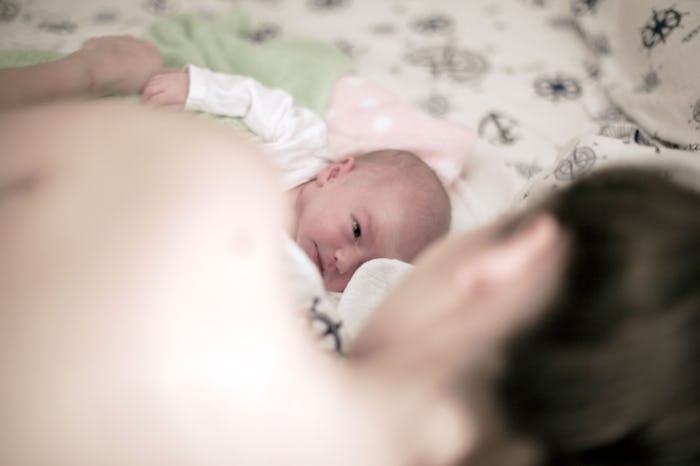Life

Here's When Your Baby Can Sleep On Their Stomach, According To Experts
One of the first worries a new mother experiences involves nighttime and how her brand new baby sleeps. Expert recommendations regarding safe newborn sleep practices are as common as they day is long, but at what point is it safe to disregard them? More specifically, when is it safe for a baby sleep on their stomach? While there are more than a few, very specific guidelines to follow, they won't be necessary for ever.
The American Academy of Pediatrics (APA) launched the "Back to Sleep" campaign in 1994 with the hopes of reducing the number of infant fatalities caused by Sudden Infant Death Syndrome (SIDS.) Placing babies on their backs to sleep was found to be the safest sleep position to minimize the risk of SIDS, and the APA went on to advice parents:
"If infants were placed to sleep on their stomachs, their risk of dying from SIDS increased by at least two-fold."
The campaign was a huge success, and The National Institute of Child Health and Human Development found that advising parents to place their babies on their back during nap and nighttime sleep led to a 50 percent decrease in cases of infant death caused by SIDS.
While it's common knowledge that all babies should be placed on their back in order to sleep safely, things change pretty quickly when you have a developing baby on your hands.
Once your baby is strong enough to turn over by themselves, your ability to control the position in which they sleep could very well be hindered. Unless you intend to stay up all night turning them back over onto their back, which is in no way recommended (sleep is important) it's a losing battle.
Baby Center says that although there is no need to worry if your baby can turn over by themselves, you still shouldn't put your baby down to sleep on his stomach initially. The site goes on to explain, saying, "You should still put [your baby] down to sleep on their back until they're 1 year old."
Baby Center also states how important it is for parents to follow other safe sleep practices to avoid the risk of SIDS. These practice include not using blankets, pillows or bumpers in the crib, not smoking in the home, and making sure the bedroom your child sleeps in is not too hot.
If your baby can turn over by themselves and you are following all other safe sleep measures, there's no need to worry of they prefer to sleep on their stomach. However, until they celebrate their first birthday, putting them to sleep on their back is best.